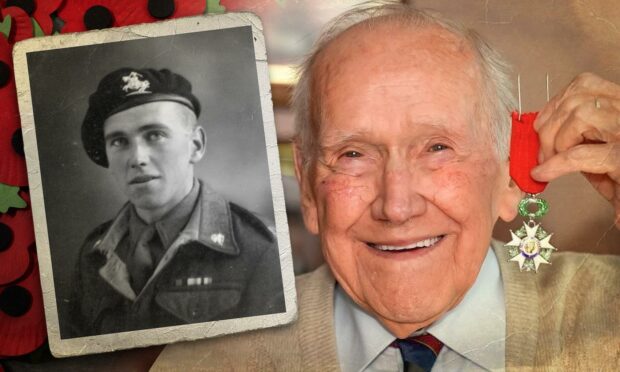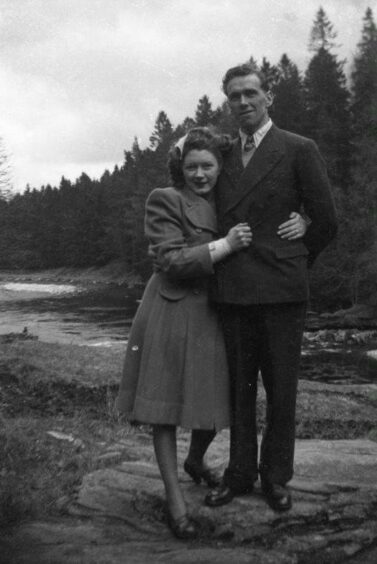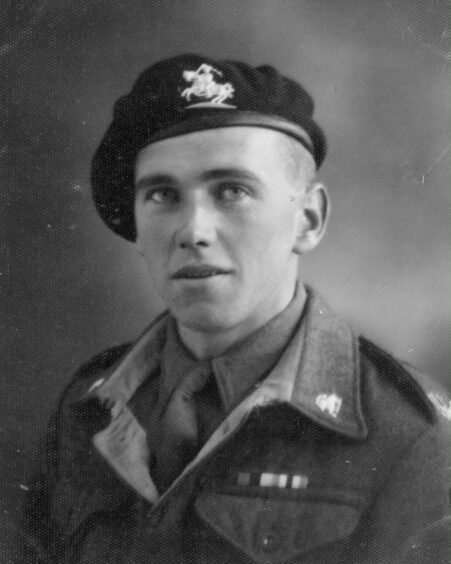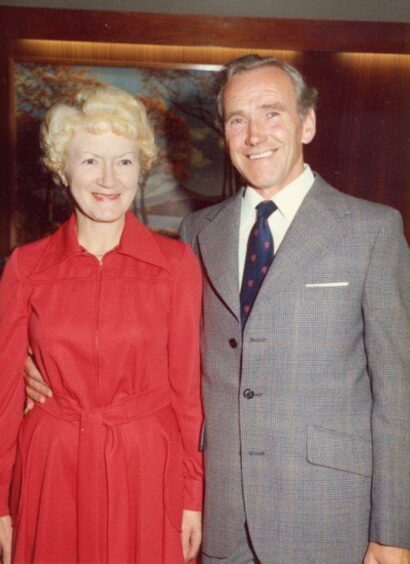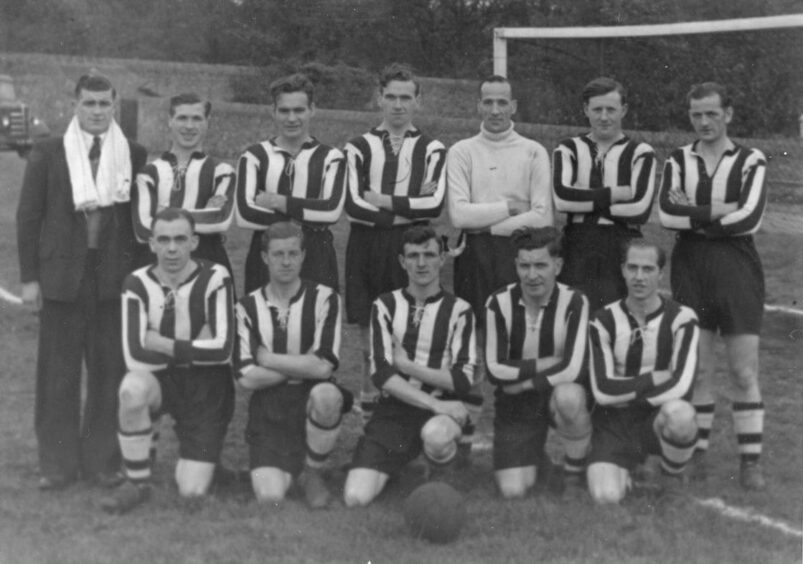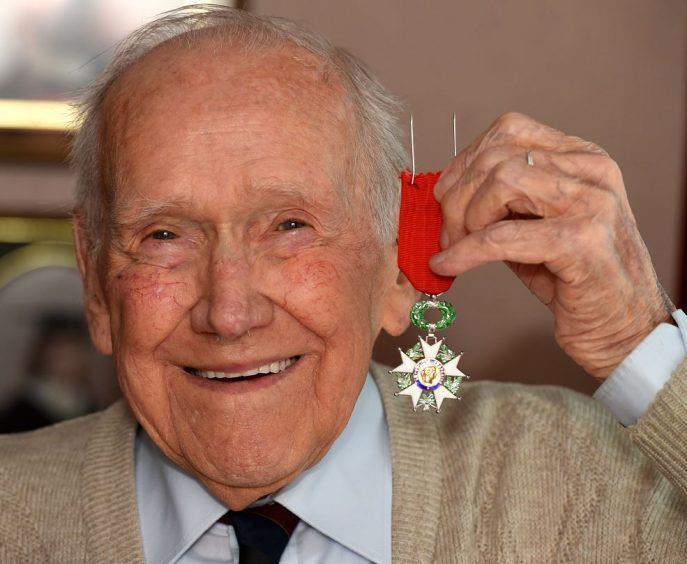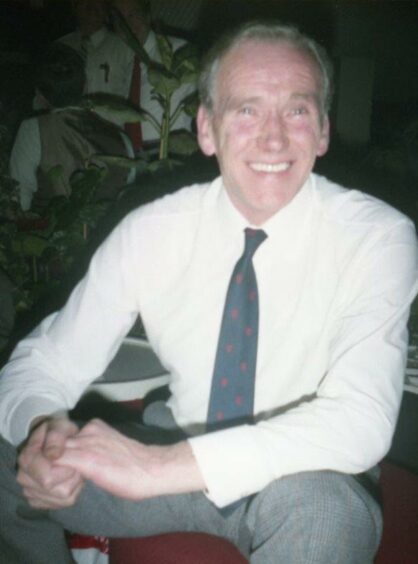Bill Diack witnessed the worst of humanity but never stopped looking for the best in people throughout his life.
The Aberdonian, who has died aged 98, was actively involved in the D-Day landings, survived a ferocious bombing onslaught from German aircraft in France and was among the first British troops to reach the notorious Bergen-Belsen concentration camp where thousands of Jews perished.
He never forgot the latter ordeal and spoke poignantly about it to the Press & Journal in 2019, but there was much more to Bill than his wartime heroics, even though they earned him the Legion d’honneur in 2017.
He was a family man, a lifelong Aberdeen FC enthusiast and a keen footballer who turned out for Keith in the Highland League – and he worked for Aberdeen Journals as a security guard and postmaster for many years.
After being employed by Davidson & Sons paper mills in Aberdeen as an accountant, Mr Diack joined the army as a wireless operator, gunner and tank driver in 1942 when he was still a teenager.
His forces service started in Blackpool, where he was sent for training and he soon became renowned for his tank-driving skills and entered Normandy two days after the D-Day landings in 1944.
He moved on to Caen, where he thought he was going to die in a field fire after myriad bombs had landed while the Allies were striving to liberate the city in northern France.
He recalled: “Bombs were raining down on us. We were in a field and almost every part of it was on fire. We were surrounded.
“I was shaking like a leaf and I thought I was a dead man. Then I just stopped shaking because there was nothing I could do about it.
“In the end, we were lucky it died out. We had German Messerschmitts coming through villages at 50ft with their guns blazing. The noise was deafening.”
The north-east man served in the Fife and Forfar Yeomanry, 11th Armoured Division, which was also known as “The Black Bull”.
As the division advanced towards the Bergen-Belsen camp, where 70,000 people died, many from starvation and illness, while others were exterminated, a German soldier approached them, waving a white flag.
Mr Diack told of his shock when arriving there. He said: “A lot of the prisoners were in a pretty awful state, and many still died.
“Our medical people got in and they did the best they could in what were terrible circumstances, but many were beyond help and there was nothing to be done.
‘I saw what looked like skeletons’
“I was in one of the leading tanks and, as we approached the camp, we began to see barbed wire and then what looked like skeletons lying on the ground.
“But we then realised that some of the ‘skeletons’ were moving and we did not understand what we were looking at. There were no words to describe it.”
Mercifully, there were happier times ahead for Mr Diack.
After the war had finished, he spent the next two years engaged in training Allied forces in Germany to use the most up-to-date equipment.
And while he was there, he was overjoyed while listening to his beloved Dons winning the Scottish Cup in 1947 with a 2-1 victory over Hibernian.
The long-time season ticket holder, who originally began going to Pittodrie in the 1940s, said: “I was able to get the use of a wireless from a German for a couple of hours for a packet of cigarettes.
“It was the first time that we had won a trophy, so I had to listen to it and I was thrilled when we ended up with the cup after a really tough match.”
After travelling back to Bucksburn, he returned to life as a sales office manager and remained there for 34 years.
He met the love of his life, Dorothy, while he was at the paper mill, and the couple tied the knot in 1949.
During their 68 years of marriage, they had three children, Bill Jnr, Alison and Jill, and seven grandchildren, Fiona, Shonagh, Catriona, Andrew, Calum, Mairi and Seamus.
Dorothy passed away just a few weeks before Mr Diack received France’s highest honour for his bravery throughout the conflict in 2017.
And, typically, for this modest character, he didn’t want a fuss made about it.
Despite losing nearly 200 tanks, more than half its complement, the 11th Armoured was responsible for several victories in the Battle of Normandy.
It subsequently participated in the rapid advance across France, Belgium, and the Netherlands and, later, embarked on the Rhine crossing in March 1945.
Mr Diack picked up his honour at a ceremony with another 10 veterans from the French Consul in Edinburgh and savoured a last meeting with comrades.
He said: “It was very good to talk to the other veterans. It was good, but I’ve never been someone who looks for the limelight.”
Mr Diack fell ill in December and moved into Balnagask House in his home city, where he died on January 26.
His son, also Bill, paid tribute to the compassion shown by the medical staff who looked after his father in the last few weeks.
He said: “My sister, who lives in Bucksburn, and I were in every day, and some days were good but, quite often, he didn’t know who we were.
“I have to say, the carers there do an amazing job with compassion and care.”
